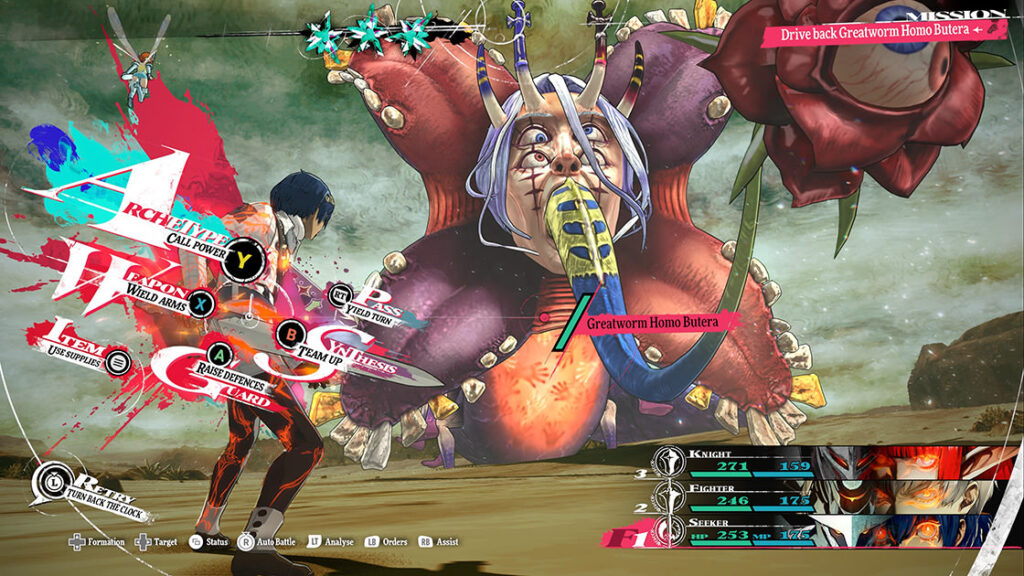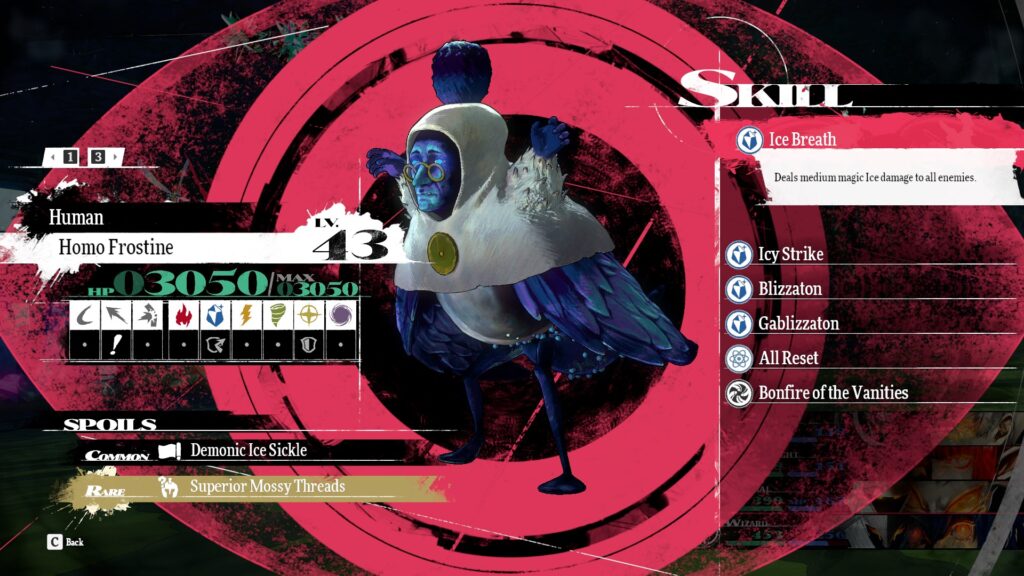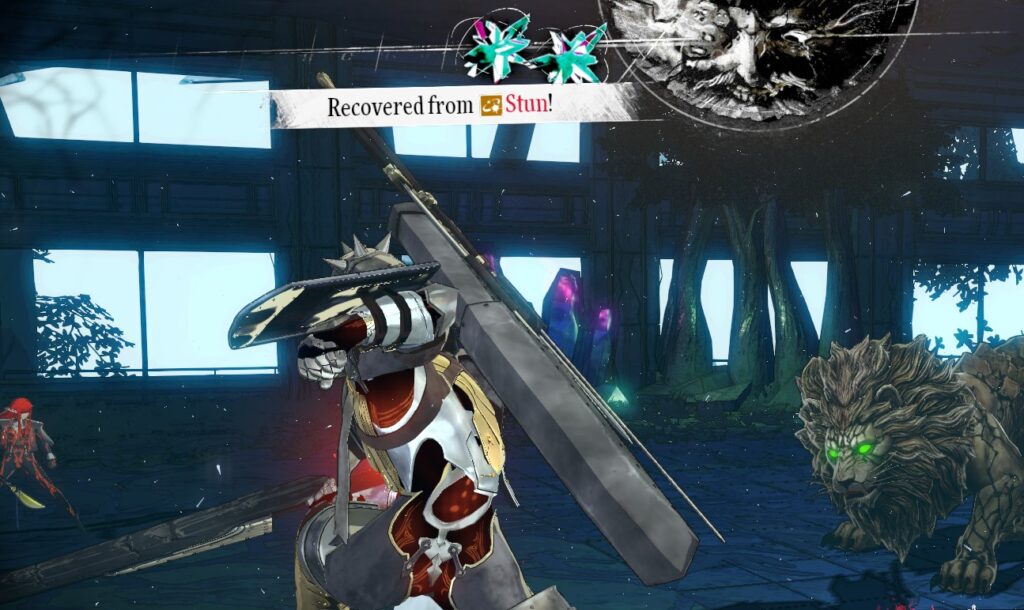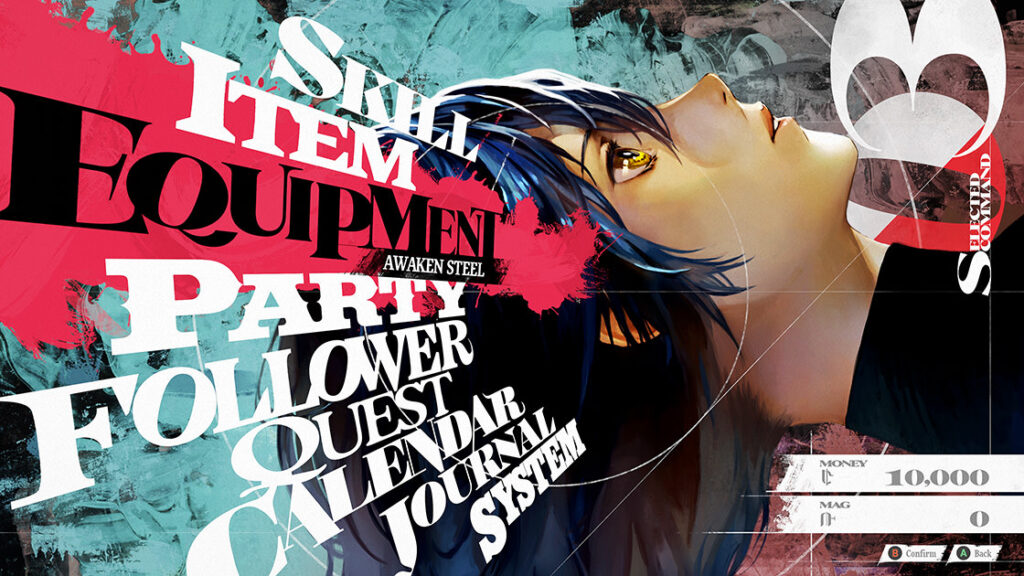I’ve been playing a lot of Atlus’s new release, Metaphor: Refantazio (Metaphor). It’s been interesting to see them grapple a lot with some of the same things I’ve been thinking about in Roll for the Gods. I’m going to focus in on one of them here: the ability to instantly retry battles and the quirks that arise from their implementation. The TL;DR is that I think the instant do-over is a great, player-friendly addition to the Atlus combat system, but that they could take it even further.
The Basics of the Metaphor Do-Over
If you’re not aware, Metaphor is a fantasy JRPG that takes a lot of inspiration from Atlus’s Persona series. The story takes place over a period of time tracked via calendar, with the player building up relationships and skills to take on challenges before too much time elapses. These challenges take the form of dungeons filled with classic-but-snappy JRPG turn-based battles.
The game design decision I want to discuss is the instant battle do-over: Metaphor lets the player restart any of these battles with the press of a button. When this button is pressed, the characters’ health, mana, and consumable items are reset, and the battle starts again from the beginning.

Up-front, I want to make it clear that I think these do-overs are a big design win. It removes a tedious aspect from the game, allowing players to avoid wasting time when they’ve made a mistake or a new discovery. In a 60+ hour RPG, removing pain points like having to redo extra content because you lost a battle goes a long way in making the player feel like at least they’re continuing to move forward.
With that said, I think the instant do-over is at it’s best when it lets you try out an encounter in the game, make some realization or two after a few exchanges with the enemy, and quickly restart the encounter to try and put new strategies into effect. Metaphor’s implementation do-over sometimes enables this, which is excellent. But there are some edge cases that arise in it that I think could be cleaned up.1 Specifically, I think it removes the cost of testing out enemy weaknesses, incentivizes player’s redoing the first turn of combat until it’s perfect, and includes some odd limitations that stand out against its otherwise snappy feel.
Weakness Testing Is Now Obsolete
Metaphor’s instant do-over removes nearly all the costs found in earlier Atlus RPGs of trying to figure out what attacks are effective against new foes. This raises the question: Why doesn’t the game just always tell us what each foe is weak to?
To lay some foundation, a large part of being effective in Metaphor’s combat is striking at foes with the correct attack. Attacks all have a physical or elemental attribute, like Slashing or Fire, and when you use an attack against a character weak to the given attribute, the attack deals more damage and only uses up half a turn.2
This makes Metaphor’s combat is very explosive. Usually, your party of up to four characters each acts once a turn. But once you can regularly exploit a foe’s weakness, you begin acting up to eight times a round. If you’ve played many JRPGs, you know that no one but bosses can typically stand up to that many attacks.
Thus, in Metaphor, like the Persona and SMT games before it, it is very important when you come across a new enemy that you figure out what it’s weaknesses are. The game provides some methods of story-telling warnings that you can use beforehand, but typically testing out an enemy’s weaknesses amounts to just hitting them with each flavor of attack until you succeed.

This, combined with an instant do-over, results in a natural approach to battling a new foe: spend your first turn trying out attacks on an enemy, determine its weakness, and reset the battle once you figure out which attacks are best. This removes the HP and MP cost of weakness testing found in earlier Atlus RPGs, where you had to live with the results of your “trial turn,” as well as likely an attack round from the enemy.3
If the player can trivially remove the HP and MP costs from testing an enemy’s weakness, one starts to wonder why the game doesn’t just tell the player each foe’s weaknesses at the start. I’ve spent some time mulling it over and haven’t come up with a very satisfactory answer.
The Perfect First Turn
The first turn of combat in RPGs is often critical. Many fights in these games are winnable on the first turn; indeed, they are likely intentionally designed as such, because long fights against basic enemies quickly become tedious and grindy. This importance, however, combines with instant do-overs to mean that players can (and will) keep restarting battles until they have the perfect first turn.4
Winning on the first turn is often already desirable in RPGs, but Metaphor rewards players even further for winning fights quickly by giving you extra experience and currency when you win without taking damage. What’s the easiest (and often only) way to avoid taking damage? Defeat your foes before they can attack, i.e. on the first turn.
On top of this, enemies can be very dangerous in Metaphor. Player turns can be quite explosive, but it is equally true for enemy turns, especially on higher difficulties where foes gain an extra action. Many enemies have party-wide attacks and will use the attacks over and over again in certain situations. If one of your party ends up being weak to such an attack, the enemy might use the attack 4+ times in a row, wiping out every person in the party.
With this information, it should be pretty clear why players would want to have a strong, if not perfect, first turn against most foes in Metaphor. They are rewarded extra for wiping out foes without getting attacked and are penalized, sometimes heavily, if a foe is able to launch attack.
What Makes an Imperfect First Turn?
Enter missed attacks.
Metaphor, like many RPGs of its ilk, includes a small percentage chance that an attack the player makes might miss. This is not so unusual, but Metaphor penalizes the player further when they miss: the party also loses an additional action. Spelling it out, if the party has two full actions remaining when they attack an enemy with its weakness, the possible results can swing between the party having one and a half action remaining on a successful attack and zero actions remaining on a miss.
Because most attacks (appear to) have a 95+% chance to hit, the instant do-over means players are heavily incentivized to redo any battles that start off with a missed attack. A bad miss can often mean the difference between receiving the flawless win bonus and an extra turn of powerful enemy attacks heading towards the party. When given that choice at the small cost of immediately playing the first turn again, its obvious why a player would just restart the battle after an early miss.
And misses are but one example of this. The instant do-over lets players avoid any low-percentage, bad events on the first turn at the cost of just playing the first turn again. For instance, some encounters in Metaphor involve foes that try to apply status effects to the entire party at the start of the battle. A typical result of the attack is that 1-2 of the party are affected, but 0 or 3 being affected is not uncommon. The difference between no one in the party being affected, letting the player focus entirely on offense, and 3 people being affected, is massive.
On top of that, the impact and persistence of status effects are also not always deterministic. Most commonly, when the player gets the jump on an enemy, the enemy is stunned for the first turn, meaning it won’t act on its next turn. But enemies will occasionally “wake up” when they take damage, meaning they will act as normal. This can create a wide range of outcomes on the first turn, with the party potentially doubling the number of turns it can take against a powerful foe if the foe doesn’t recover from stun.

Finally, two other standouts in this area are escaping battles and the Steal ability. Without diving into the specifics, both are often the first action a player will try in an encounter when they use them. And both can fail. If either of these fail, only some sense that it is dishonorable to reset the encounter would keep a player from just resetting and trying again.
The First Turn Solution
My solution to all of this is that I would make most, if not all, effects either 100% accurate or 0% accurate on the first turn. If a game is going to let players instantly reset to the first turn (which, as I’ve said, I think is a good thing), it is permitting them to keep doing the first turn again and again until they get the exact sequence of die rolls they want. So I would remove the die rolls.
Attacks and Steal should always hit on the first turn unless a mechanic specifically always makes them miss. For a given foe, stun should either always fade on hit or never. Status effects should always impact a certain number of characters (and likely the same ones each time, though that is not as egregious).
There’s an argument that this kind of thing also applies to the second turn and later as well. To be honest, I’m not huge fan of percentage-based, all-or-nothing abilities in most games, so I would certainly hear the argument out.
But as a player starts to get further into the encounter, restarting is both a bigger time commitment and provides less of a relative payoff. (1) The player is having to redo more of the fight, which both takes longer and means there are likely to be at least some bad outcomes, and (2) the player likely already lost any flawless victory bonus by permitting the enemy a turn’s worth of actions. So I don’t view “the perfect second” turn as being as much of a problem as the first turn.
Limitations of the Metaphor Do-Over
In addition to effectively removing weakness testing and incentivizing players to redo the first turn until it is perfect, the Metaphor do-over system also has some odd gaps that are kind of surprising given how fast and skippable many other things are in the game.
Players Can Only Trigger a Do-Over on Their Turn
The first shortcoming is that players are not able to restart the battle during the opponent’s turn. This has some minor impacts like making it faster, for instance, to weakness test with the party’s first characters until there is only have one action remaining, and then restart the encounter rather than using the last action.
Far more annoying, however, is when an enemy unexpectedly begins wiping the floor with the party (perhaps after a missed attack that ended the party’s turn). The player is stuck watching the animations until their party is completely dead. And upon death, they can no longer restart the battle. Instead, they are sent back to the last checkpoint/save.
It’s a notable time waster in a game that seems to take great pains to always avoid wasting your time.
Players Cannot Use a Do-Over to Change Archetypes
The second odd gap in the do-over system is that it does not let players change their equipment before restarting the battle. More specifically, they cannot change the party’s Archetypes, making certain battles unwinnable without taking the loss (or closing the game) and reloading.

Archetypes are what determine a character’s abilities and weaknesses, akin to something like the Job System in Final Fantasy or other JRPGs. Given the importance of having the right abilities to exploit a foes’ weaknesses, trivial fights can become impossible with the wrong Archetypes. Being unable to change Archetypes with the do-over results in it feeling somewhat incomplete: a player can use the do-over to quickly try alternative tactics against a challenging foe, but a key component of their tactical arsenal, the ability to change character abilities, is restricted.
In practice, this isn’t as much of a hindrance as I thought it might be starting out. The game spends a great deal of time and resources giving the player the means to see beforehand what archetypes they should probably be using before a given encounter. And bosses, the strictest “tests” of the party, universally have save points right beforehand. It also checkpoints quite a bit more generously than other Atlus titles (though I’ve always felt nervous relying on it).
But it is just a strange choice, particularly in the light of the Persona series, which lets the main character switch between abilities at any point during an encounter for free once per turn. Persona’s combat is meaningfully different from Metaphor’s, with Metaphor’s systems generally feeling the more modern of the two, but this is a case where it feels like the reverse. Even if the goal is to keep characters from accessing too many abilities during a single encounter, it would be dramatically more convenient for the player to be able to do something like switch a character’s archetype during the first turn of the encounter, before they’ve taken an action.
Conclusion
I’ll end this the way I started: I’ve really been enjoying Metaphor: Refantazio, and I think the battle do-over system is a great addition to the game. As a new addition to the Atlus RPG system, however, there are some places where it grinds against the legacy design, resulting in some avoidable tedium. I hope to see Atlus build on this, whether through patches or sequels, and I think there’s a lot other game designers can take away from considering Atlus’s implementation.
- There are certainly arguments or reasons for not including a do-over mechanic at all. This discussion, however, will center around pain points with the mechanic itself and how one might address it, rather than on whether the game should include the mechanic or not. As I said, I view the mechanic as a success overall. ↩︎
- There’s a decent amount more complexity in Metaphor than a weakness-striking action taking only “half a turn,” but this succinct description is enough for our purposes. ↩︎
- In the earlier Atlus RPGs, you could achieve a similar result by saving your game, testing out an enemy’s weaknesses and then reset to your earlier save. But this often requires the player to redo more of the game then just the single fight; at a certain point, it makes more sense to just look up the enemy in a guide if that’s the player’s goal. ↩︎
- The weakness testing behaviors described above is actually a subset of this behavior. Trialing attacks to find which works the best is useful with respect to player knowledge, but very inefficient in regards to that specific battle: you spend your first actions do a fraction of your potential damage when you could have been doing 6-8 attacks with bonuses. ↩︎
